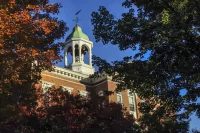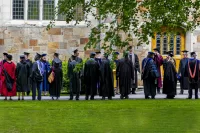
Bates has announced four faculty promotions, including tenure awards, effective Aug. 1 for the 2019–20 academic year.
Travis Gould, physics, and Michael Rocque, sociology, were promoted from assistant to associate professor and were granted tenure. Krista Aronson, psychology, was promoted from associate to full professor. Anita Charles, education, was promoted from lecturer to senior lecturer.
The promotions were recommended by the faculty’s Committee on Personnel and approved by the Bates College Board of Trustees.
“Their extraordinary talents are emblematic of the across-the-board excellence of the Bates faculty.”
“The faculty whose promotions we are celebrating this year, in physics, sociology, education, and psychology, are not only leading scholars, but also, through their teaching, guides who lead our students and our community to engage with important ideas,” said Malcolm Hill, vice president for academic affairs and dean of the faculty.
“Their extraordinary talents are emblematic of the across-the-board excellence of the Bates faculty.”
Meet the four newly promoted faculty members, learn their research fields, and discover why they teach.
Associate Professor of Physics Travis Gould
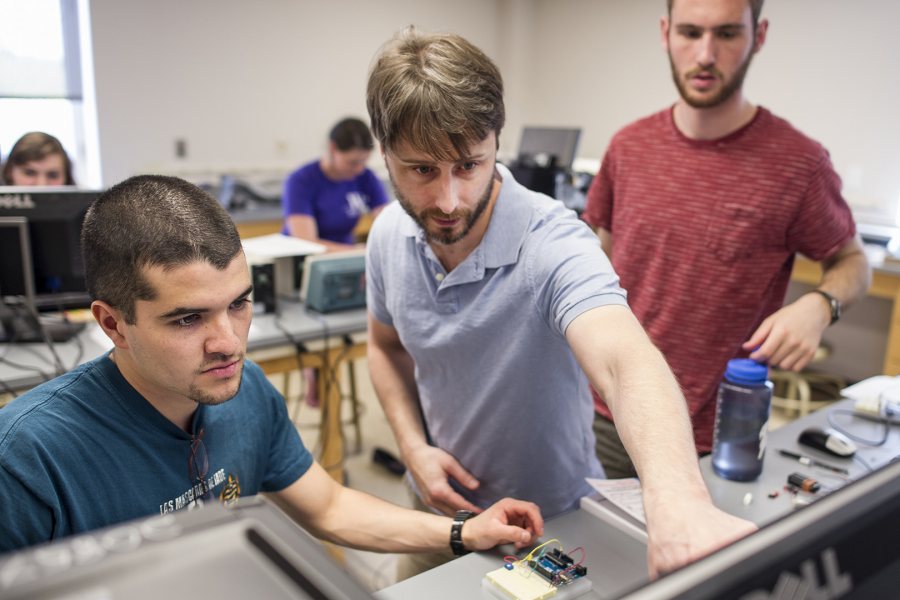
Assistant Professor of Physics Travis Gould (center) works students during his Short Term course “Microcontroller Laboratory” in 2015. (Josh Kuckens/Bates College)
Appointment year: 2013
Doctoral institution: University of Maine, Orono
Fields of research: Adaptive optics, development and application of fluorescence microscopy techniques, fluorescence correlation spectroscopy, fluorescence nanoscopy, image processing, light-sheet microscopy, STED microscopy, super-resolution microscopy
Why I teach: Having been primarily a researcher before coming to Bates, I’ve been pleasantly surprised that teaching has been such a rewarding experience. It has also been an opportunity for me to learn — as I’m trying to work concepts out for myself, I’m sharing the thought process with the students, making connections between technologies and the physics behind them. The students and I have been able to go through the process of figuring it out together.
Our students really get into the material and many of them want to apply it in a research setting. It’s been really nice to see that excitement, and to have students come from classes into my lab to do summer research, senior thesis, or independent study.
Associate Professor of Sociology Michael Rocque
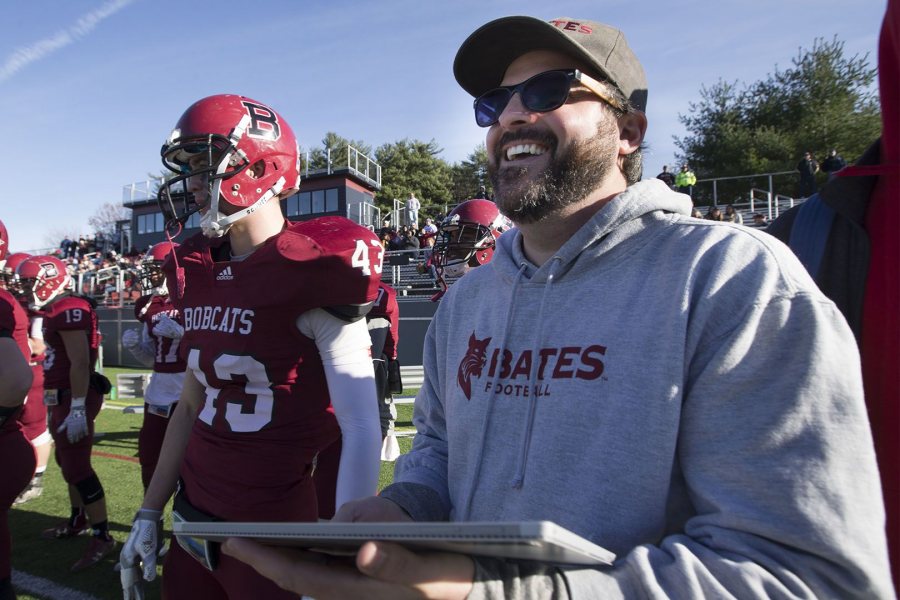
Associate Professor of Sociology Michael Rocque is also the faculty liaison to the Bobcat football team. (Phyllis Graber Jensen/Bates College)
Appointment year: 2014
Doctoral institution: Northeastern University
Fields of research: Biosocial crime prevention, corrections, criminology theory, desistance from crime, life-course criminology, race and crime, race and school discipline, risk assessment in corrections, survey research
Why I teach: I feel like I am among the luckiest people in the world to be able to call Bates College my professional home. It is an institution that truly values educating the whole person and allows us as professors to do that in innovative and creative ways.
As professors, we get to witness and play a small part in the development of young people as they make their way from their teens into adulthood, becoming the people they will be for the rest of their lives. It is an honor to be able to do this for a living.
Professor of Psychology Krista Aronson
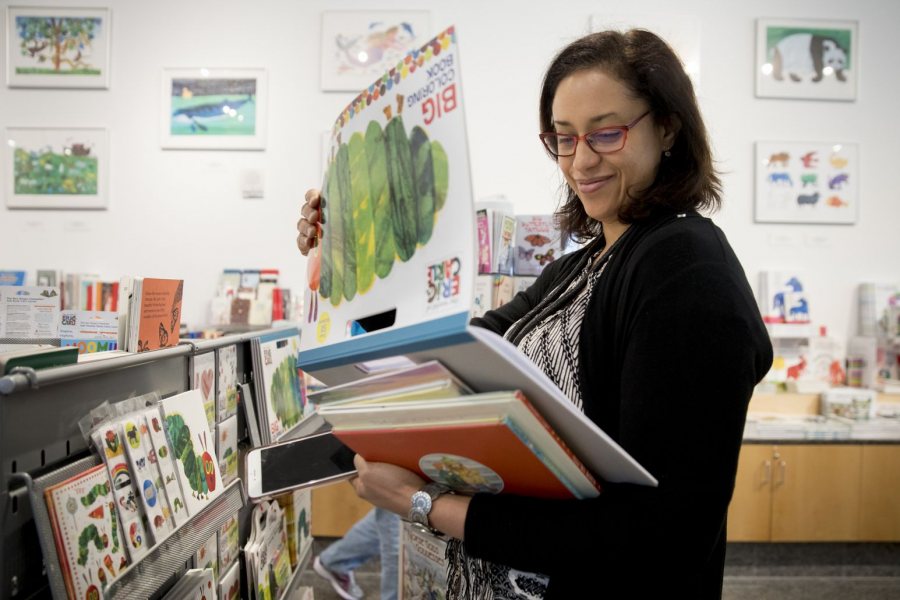
Professor of Psychology Krista Aronson reviews picture books during a Short Term course trip to the Eric Carle Museum of Picture Book Art in Amherst, Mass., in 2017. (Phyllis Graber Jensen/Bates College)
Appointment year: 2003
Doctoral institution: University of Michigan
Fields of research: Digital humanities, multicultural children’s literature, intercultural competence, racial and ethnic identity development, acculturation, immigration, psychometric assessment
Why I teach: I love my job because I get to engage amazing students in meaningful work designed to affect contemporary social problems — every day.
Whether it’s in the classroom, in the library, at school, or online through the Diverse BookFinder, I love working with Bates students to bring theory and research into practice. This is my passion.
Senior Lecturer in Education and Director of Secondary Teacher Education Anita Charles
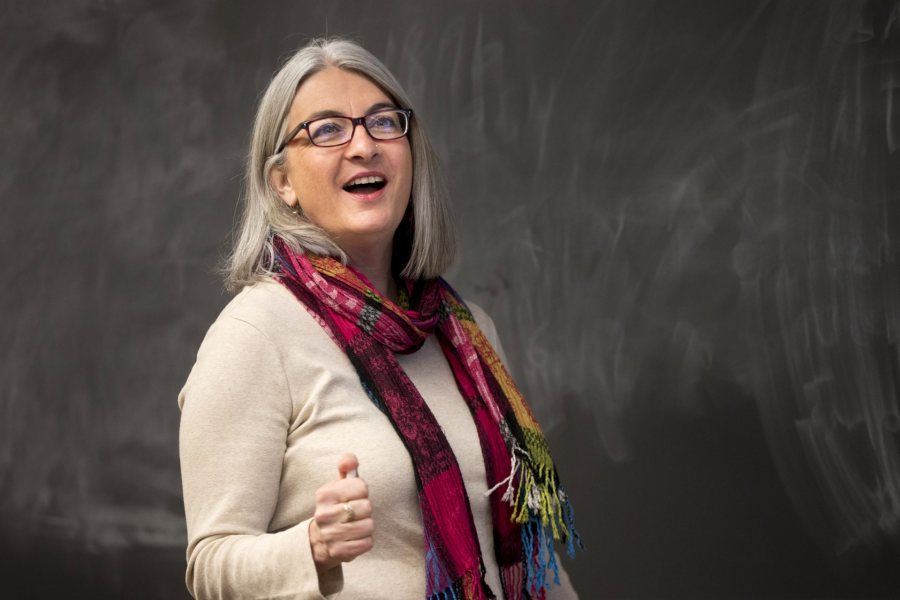
Senior Lecturer in Education Anita Charles teaches a course on topics in special education in 2018. (Phyllis Graber Jensen/Bates College)
Appointment year: 2004
Doctoral institution: University of New Hampshire
Fields of research: Early and adolescent literacy, public education reform, special education, teacher education
Why I teach: I come from a long line of educators — my passion for teaching is literally in my blood! After years of teaching in K–12 venues, I now teach future educators at Bates who aim to make the world a better place for all children and youth. I hope to cultivate in my students a love of learning and teaching in relationship with young people in the community and beyond.
I believe that the work I do encourages transformative reflection and engagement, rigorous ideological exploration tied to practical civic action, and a commitment to social justice within educational institutions.
Education is the linchpin of democracy; the courses I teach in literacy, special education, and teacher education aim to disrupt hegemonies and assumptions around systemic power structures and around concepts of ability and possibility. My hope is that students leave my courses with at least as many questions as answers.
